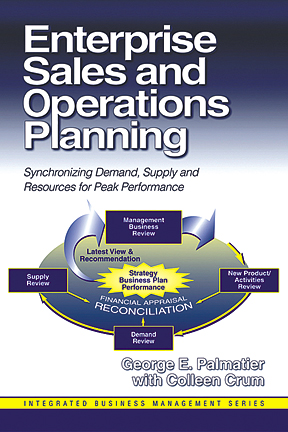Creating Entrepreneurial Supply Chains
$54.95
A Guide for Innovation and Growth
By William B. Lee, Ph.D.
Hardcover, 6 x 9, 400 pages
ISBN: 978-1-60427-062-4
March 2012
Description
The most obvious form of entrepreneurship is that of starting a new business; however, in recent years, the term has been extended to include other forms of entrepreneurial activity. Corporate entrepreneurship is the process by which teams within an established company conceive, foster, launch, and manage a new business that is distinct from the parent company but leverages the parent’s assets, market position, capabilities, or other resources. A new, but similar form of entrepreneurial activity is the entrepreneurial supply chain. A supply chain connects customers with suppliers. An entrepreneurial supply chain is an innovative portion of that connection. The entrepreneurial supply chain usually consists of a new venture that is developed out of new and innovative ideas. The venture is responsible for resources, takes on risks, and is accountable for the payoffs.
Most organizations view their supply chains merely as cost centers, not recognizing the fact that supply chains are well positioned to be the entrepreneurial drivers of the company. Entrepreneurial supply chains can look for innovation and revenue opportunities wherever they may be found: upstream on the supply side, downstream on the demand side, or with competitors in the middle. This book focuses on unexplored opportunities for growth and innovation through entrepreneurial supply chains. It shows how entrepreneurial supply chains can enhance the value of a business regardless of its form. Creating Entrepreneurial Supply Chains: A Guide for Innovation and Growth takes the reader through the entire process of opportunity identification, due diligence, writing the business plan, managing risks, integrating the entrepreneurial supply chain venture, and reaping the payoff.
Key Features
- Shows how leading companies such as Cisco, 3M, CEMEX, Corning, SYSCO, and several others have developed entrepreneurial supply chains, as well as the value each company gained from them
- Discusses how the SCOR® model provides a framework for identifying entrepreneurial supply chain opportunities, plus how and where needs and opportunities are likely to appear including how to recognize them
- Uses a single entrepreneurial supply chain case throughout to show how one company employed the ideas, concepts, tools, and techniques covered in each chapter, and includes additional business case summaries at the end of each chapter to enhance understanding of the concepts and to provide opportunity for further study and reflection
- Covers various practical and legal forms of entrepreneurial relationships, including alliances, consortia, dealers, joint ventures, and partnerships, and explains the different ways these can be used
- Employs appendices to illustrate how to develop an entrepreneurial supply chain vision, show a sample business plan, and demonstrate how education and training programs can be developed
- WAV features answers to end-of-chapter questions and the following presentations for use in educational courses: Building Blocks for Excellence in Entrepreneurial Supply Chains, Entrepreneurial Supply Chains Executive Workshop, and Strategic Issues for Entrepreneurial Supply Chains — available from the Web Added Value™ Download Resource Center
About the author(s)
Dr. William B. Lee is presently an active educator, consultant, and author. He holds a Ph.D. in Business Administration from the University of North Carolina at Chapel Hill, an MBA from Rollins College, and a BSEE from Vanderbilt University. Bill has had notable careers in industry, academia, and consulting. He has consulted and taught in over 50 countries, spent 10 years on the faculty of the College of Business Administration at the University of Houston and was also chair of the Department of Systems and Operations Management. He also held positions at Rice University as Associate Dean of Executive Education and Director of Energy Programs. Dr. Lee is the author of over 75 books, articles, and academic presentations and is a sought-after speaker. He is also the co-author of Leading Effective Supply Chain Transformations: A Guide to Sustainable World-Class Capability and Results, which was published in 2010.
Table of Contents
Chapter 1: Introduction to Supply Chains and Entrepreneurship
Chapter 2: Why “Entrepreneurial” Supply Chains
Chapter 3: Utilizing Customers and Suppliers as Sources of Ideas and Opportunities
Chapter 4: How We Know We Have Opportunities
Chapter 5: Managing the Risks of Entrepreneurial Supply Chains
Chapter 6: Due Diligence and the Business Plan
Chapter 7: Implementing Entrepreneurial Supply Chains
Chapter 8: Reaping the Payoff
Appendix A: Visioning Entrepreneurial Supply Chains
Appendix B: Sample Business Plan for an Entrepreneurial Supply Chain Opportunity
Appendix C: Sample Education and Training Programs for Entrepreneurial Supply Chains
Appendix D: Glossary of Entrepreneurial Supply Chain Terms
Index
Reviews
“I enthusiastically recommend this book for your company to study, teach, and implement the ideas, concepts, tools, and techniques contained herein. The new concept of supply chain elements being used in an entrepreneurial manner is a commanding thought that deserves to be looked at carefully.”
—F. Robert Jacobs, Ph.D., Chase Faculty Fellow, Professor of Operations and Supply Chain Management, Kelley School of Business, Indiana University
“I highly recommend that every company with supply chains pays particular attention to this book and seek to implement its ideas. It is destined to be recognized as a pioneering work.”
—Michael R. Katzorke, CEO, Bryce Consulting Group
“Dr. Lee is to be commended for his insights and contributions to the field with this unique new book.”
—Professor Robert D. Hisrich, Ph.D., Director, Walker Center for Global Entrepreneurship, Thunderbird School of Global Management
Related products
-

Handbook for Supply Chain Risk Management
Retail Price: $79.95$69.95 Add to cart -

ROI of Software Process Improvement
Retail Price: $59.95$49.95 Add to cart -

Essential Project Investment Governance and Reporting
Retail Price: $59.95$49.95 Add to cart -

Project Scheduling and Cost Control
Retail Price: $59.95$49.95 Add to cart -

Enterprise Sales and Operations Planning
Retail Price: $54.95$49.95 Add to cart

